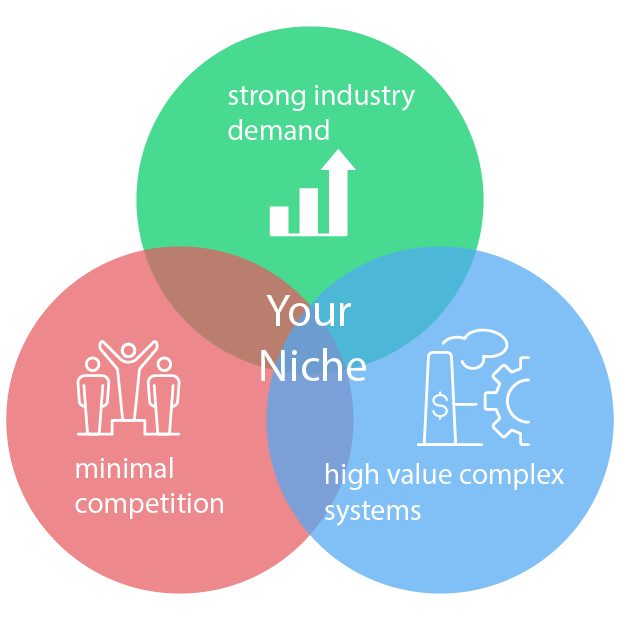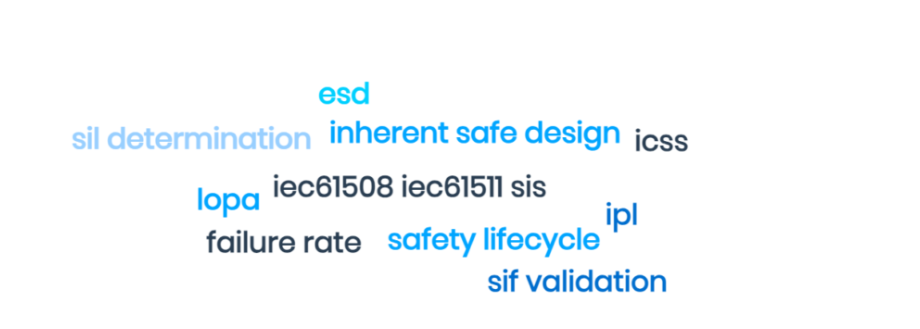
How to Earn More Money: 5 Steps for Automation Engineers

Do you have skills in Automation, Control systems or Instrumentation? Do you wish your valuable skillset and experience could return a better income?
There’s a common belief that the only way to boost your salary is by ascending into leadership and management positions. However, the added workload and stress often outweigh the financial gains.
In this article, we present five steps to maximize your earning potential and guide you in making informed choices to navigate the industry effectively.
Step 1 – Chose a Niche Discipline

Engineers who command the highest day rates are “specialists” with a deep understanding of high value, complex systems that are critical to plant operation, production or safety (mission critical).
The key concept of a niche discipline in engineering is one which has a high industry demand with low supply of qualified candidates.
In addition, a niche discipline should involve systems or process which is complex which demands a long learning curve. In essence, the barriers to entry and for becoming a competent person within a niche should be extremely high.

Niche automaton disciplines are also characterized as “multidicaplined” by comprising multiple and diverse fields of engineering such as process dynamics, control systems and industrial networks.
Some examples of niche disciplines are;
- HVAC Automation
- System Integration
- Cyber Security for ICS
- Process Safety
HVAC Automation

HVAC engineering is a multi-disciplinary field that demands a thorough grasp of control systems, instrumentation, and motors. In addition, a proficiency in thermodynamics and a deep understanding of HVAC balancing principals.
In HVAC Engineering, a solid comprehension of thermodynamics is important as it forms the foundation for understanding how heat transfer, energy conversion, and fluid dynamics impact HVAC systems.
HVAC Control Systems
HVAC engineers must possess a strong competency in control systems design. This evolves designing and implementing control strategies for automation of HVAC operation throughout all operating cases.
HVAC systems will normally require a lot of integration with other ICS located in the same facility such as DCS/SCADA. This integration requires the design and development of application software for exchanging control signals and process data.
HVAC Instrumentation
An understanding of instrumentation is essential for HVAC engineers. This involves familiarity with various sensors, transducers, and instruments used to measure and monitor critical parameters within HVAC process.
Engineers should be proficient in selecting, calibrating, and maintaining instrumentation devices to ensure accurate and reliable data acquisition.
By combining knowledge in thermodynamics, process analysis, control systems design, and instrumentation, this ensure the talent pool of competent candidate is small within the field of HVAC engineering and consequently you can expect to have a good salary profile.
Industrial Control System Integration

The integration of Industrial Control Systems (ICS) is a critical skillset, yet often poorly executed by engineering contractors.
System integration involves designing and commissioning interfaces between SCADA, DCS, and PLCs, consolidating multiple different ICS systems to function together.
In a process facility it is common to have several auxiliary systems or “packages” designed and constructed by specialist vendors. These packages must be interfaced with the plant’s primary ICS (SCADA or DCS).
Package integration involves designing interfaces between the package control system and the plant’s native control system (DCS or SCADA), facilitating monitoring and control.
The integration of vendor-supplied packages requires a specialized skillset that is not widely available and is often sub optimally handled by large engineering contractors.
System integration is usually managed well by specialist firms known in the industry as Independent System Integrators. These experts excel in integrating auxiliary packages, IT systems, and industrial control systems, ensuring seamless operation.
Analysing Project Requirements
System Integrators must analyse both project and regulatory requirements to ensure that vendor package design is compliant and that all interfaces to other systems are considered and designed correctly.
This task demands interdisciplinary coordination, relying on a combination of skillsets such as industrial networks, cyber security, cable management, and electrical engineering.
Designing and Commissioning Interfaces
A core aspect of integration involves designing and commissioning interfaces with the plant’s control system, typically DCS or SCADA.
This requires proficiency in developing specification documentation for ICS application software and designing HMI graphics.
Integrators must possess a comprehensive understanding of the package’s control system, along with the associated application software executed in the vendor’s Programmable Logic Controller (PLC).
Thoroughly defining the interactions between ICS and PLC application software is crucial to prevent costly delays and rework during later commissioning phases.
Getting hands on experience in the integration of large and complex packages, such as Compressors, Gas Turbine Generators and HVAC will greatly enhance long term employability and salary expectations.
Cyber Security for ICS

The approach to ICS Cyber Security has evolved rapidly in the last 20 years. Advances in ICS technology and increase integration with enterprise networks has expedited the requirement for increased cyber security measures.
Industrial Automation Cyber Security has seen a transition from being a peripheral automation activity to a now being a fully-fledged discipline.
The demand for Automation Engineers equipped with cyber security expertise has largely outpaced the availability of qualified professionals, leading to a shortage within the industry.
The International Society of Automation (ISA) recognized the need for a comprehensive standard specifically tailored to the unique requirements of ICS cybersecurity and introduced IEC62443 in 2021 based on ANSI/ISA-62443.
The widespread adoption of IEC 62443 reflects the industry’s recognition of the critical importance of protecting ICS from cyber threats.
There is both good demand and well paid roles available for automation engineers with expertise in cyber security and who are fully conversant with all parts of IEC62443.
Process Safety

Automation engineers with a comprehensive understanding of process safety are a valuable asset within any engineering team.
By combining both automation skillsets with good understanding of IEC61511, engineers can more efficiently manage the implementation of functional safety design inputs (such as SRS) within ICS.
While formal training courses have their merits, nothing can substitute hands-on, real-life experience. If given the opportunity you should actively seek involvement in functional safety activities such as SIL assessment, SIL calculation and development of SRS dossier.
The depth and complexity of IEC61511 has propelled the advance of many consultancy firms which specialize in its interpretation, offering services for SIL determination and SIF calculation.
One widely recognized certification in the field of functional safety is the TUV certification. It has become a badge of honour for many engineers, displayed proudly in email signatures. However, the ubiquity of this certification has led some to question its true assessment of functional safety competence.
In reality, many TUV-certified individuals have little or no practical experience in SIL assessment or calculation. True competency in functional safety is only acquired over time through hands-on experience using the calculation tools and through participation in SIL assessment workshops.
How can I get a Niche Skillset?
Work with Specialists
To acquire specialist skills, it’s essential to gain hands-on experience by working directly with vendors or specialist automation integrators who offer training and real-world exposure.
After dedicating a few years, you should have developed a sufficient level of competency to pursue high-paying consultancy roles.
Conversely, spending too much time in the early stages of your career working for large engineering contractors and operators may result in the development of general skillsets applicable mainly to the EPC industry.
These skills, such as regulatory compliance, project engineering, and procurement, are undoubtedly important, but the pool of candidates with similar abilities is vast, limiting salary prospects. It is essential to firstly develop a good basic knowledge of automation systems and technologies.
Instead, consider transitioning to EPC roles as a consultant once you have established a solid foundation of competency in your chosen niche discipline. This strategic move allows you to leverage your specialized skills and command higher salaries in the consultancy market
Self Study and Professional Development
An excellent way to acquire new skills is by doing your own research, by reviewing industry accredited books, engineering journals and conference papers. There is a lot of free content available online or available at low cost.
If you want to specialize in a certain engineering topic, then a good way to start is by doing a literary review of published works.
The main objective is to become a conversant in all aspects of your chosen engineering niche such as;
- Design configurations for different operating cases
- Commissioning practices and guidelines
- Common issues and solutions
- Regulatory compliance and normative standards in EU, UK and USA
Step 2 – Become an Essential Person

Become a Leading Technical Authority Figure
Aim to become the go-to person who is indispensable and relied upon by everyone.
- Work hard to become a respected authority in your field or discipline by dedicating yourself to continuous improvement.
- Immerse yourself in knowledge acquisition, absorbing as much information as possible.
- Seek out opportunities to take ownership of complex or critical work scopes that directly impact the organization’s success.
Don’t just work hard, Work Smart
Remember, this strategy is not solely about working hard, but also about working smart. Direct your energies toward activities that will have the greatest leverage and impact.
By adopting this approach, you can establish yourself as a trusted expert and increase your value within the organization. Achieving this type of status will open the door to negotiate higher salaries and day rates with your management.
Step 3 – Don’t Be Invisible

Are you doing all the work?
In large teams, it is not uncommon for one individual to shoulder most of the workload. This could be due to their superior experience, training, or simply a stronger work ethic.
Unfortunately, management often lacks visibility into the workload distribution among individual employees. They tend to focus on the total number of man hours consumed by teams and departments rather than individual contributions.
If you find yourself in this situation, it becomes crucial to take proactive steps to ensure that your overperformance is recognized and acknowledged by management.
Record and Quantify your Workload with KPIs
Make a concerted effort to meticulously record all your activities and establish a set of key performance indicators (KPIs) that align with your job responsibilities.
Create a clear Excel dashboard that incorporates charts, trend curves, and visual indicators to track your KPIs effectively. When appropriate opportunities arise, share this dashboard with your management.
Ensure Your Contributions are Recognized
By ensuring that your job performance is quantified and recognized by management, you increase your value within the organization.
This can lead to contract extensions and rate increases, as your contributions become more apparent and appreciated.
Step 4 – Switch from Staff to Contract Roles

Experienced automation professionals often face a decision in their careers to work as permanent staff or as contractors/freelancers through staffing agencies.
While permanent positions can offer stability, it is crucial to consider contractor roles which typically offer much greater financial returns.
Automation professionals who have established a solid skillset combined with extensive industry experience may be eligible to apply for highly-paid consulting roles.
Contractors vs Staff Pay
While staff engineers enjoy the stability of a steady pay check, their salaries frequently fall short of the competitive rates offered to contractors.
Although exceptional company benefits may offset this disparity, such instances are becoming more rare.
What about Staff Benefits?
Traditionally, permanent staff positions offered robust pension plans, ensuring employees a reliable income in retirement. These plans aimed to provide stability and long-term financial support.
However, economic fluctuations, regulatory changes, and evolving business practices have led many companies to scale back their pension programs or shift retirement planning responsibility to employees. Consequently, the pension plans available to staff engineers have become less generous and reliable.
In contrast, contractors negotiate higher rates and have the flexibility to allocate a portion of their income to retirement savings. This allows them to explore various investment options, tailor their savings strategies, and adapt plans based on individual circumstances.
Flexibility and Adaptability
Contractors can enjoy a higher level of flexibility in their work arrangements. With the ability to choose projects and assignments, contractors can be more agile and adaptable.
This flexibility allows them to gain diverse experience and exposure to various technologies and environments, enhancing their skillset and doing so at a much more accelerated pace.
In contrast, permanent staff members often have limited mobility and are bound to a specific roles or project, potentially hindering their professional growth.
Contracting can give You more “breath” of Industry Experience
While the permanent staff engineer may develop an in-depth understanding within their industry sector, their exposure to diverse project environments, methodologies, and industry stakeholders may be limited.
On the other hand, the contract engineer’s ability to engage with various projects allows them to accumulate a wealth of experience working with different clients, contractors, and suppliers.
This exposure can broaden their skill set, deepen their industry knowledge, and enhance their adaptability to changing project requirements.
The exposure to different operators, contractors, and vendors provides contract engineers with a comprehensive understanding of industry practices, standards, and technologies.
They gain insights into the strengths and weaknesses of different approaches, learn from a variety of project management styles, and establish a network of professional connections across the industry.
Step 5 – Chase the Money Not the Glory

In the world of engineering, it’s common to become fixated on gaining recognition and status. However, this doesn’t necessarily lead to increased income.
The highest-paid engineers understand the importance of efficiency and maximizing output from their efforts. Instead of chasing glory, they focus on working smart, not hard.
Know When to Squeeze
Recognizing your own value and using it as leverage is crucial. This is especially true when you’ve recently taken on more responsibility in your role. This is the best time to approach your employer and request a pay increase.
Unfortunately, many individuals shy away from this step, continuing to work at the same salary even while their value and contributions to the company have increased.
If your role within the company has become indispensable, it’s important to firmly engage with management and assert your request for a pay increase.
Conclusion
Navigating your career in the field of automation engineering involves several key steps outlined in this guide.
By selecting a niche discipline, becoming indispensable in your role, documenting your KPIs, ensuring recognition, transitioning to contract roles, and prioritizing financial gains over prestige, you can strategically enhance your earning potential and professional growth in the industry.
